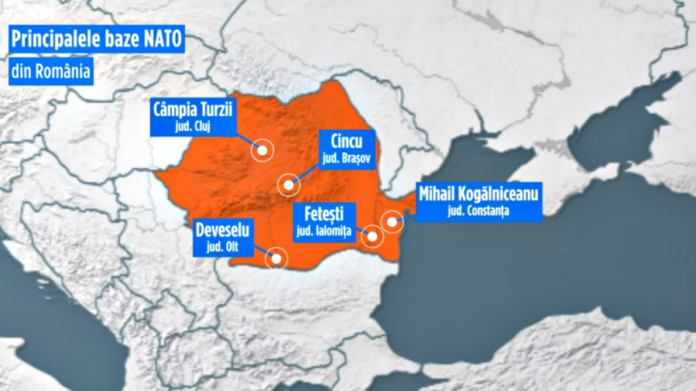At the end of October, the United States announced a plan to reduce its military presence in Romania. Romanian Minister of Defense Ionut Mosteanu clarified that this move does not represent a withdrawal of U.S. forces but a temporary suspension of the rotation of a brigade that operates on NATO’s eastern flank. He explained that the decision forms part of a broader U.S. strategy to focus more attention on the Indo-Pacific region while maintaining full commitments in Eastern Europe. To what extent could the Republic of Moldova feel the indirect consequences?
On October 29, Minister Mosteanu stated that around 900–1,000 American soldiers will remain in Romania — “slightly above the level before the start of the war in Ukraine” — out of approximately 1,700. “The other allies, together with France, Belgium, Spain, Luxembourg, Portugal, and North Macedonia, will remain here,” he said.
Most of the U.S. troops are stationed at the Mihail Kogalniceanu base. After nearly half of them withdraw, about 2,500 foreign troops will remain in Romania, most of them French. They form part of the NATO battle group in Cincu. NATO operates bases in Constanta, Cincu, Fetesti, Deveselu, and Campia Turzii.
NATO officials asserted that the planned reduction will not affect Europe’s defensive capacity. U.S. Ambassador to NATO Matthew Whitaker reaffirmed that the United States remains committed to Romania “as a trusted NATO ally, a vital strategic partner, and a key force for Europe’s security.” He added that the U.S. presence remains solid and unwavering, including support for Operation Eastern Sentry.
“Within NATO, allies such as Romania demonstrate increased capacity and responsibility. For more than 20 years as a NATO ally, Romania has worked with the United States to achieve our common defense goals. This partnership remains stronger than ever. The United States stands by Romania — a trusted NATO ally, a vital strategic partner, and a key force for Europe’s security. Our solid presence and enduring commitment to Europe remain steadfast, including support for Operation Eastern Sentry,” Whitaker wrote on X.
On October 31, Romanian Foreign Minister Oana Toiu discussed Black Sea regional security and the bilateral strategic partnership with Ambassador Whitaker.
“I had an important discussion with Matthew G. Whitaker, the U.S. Ambassador to NATO — a key voice in Euro-Atlantic security — about the next steps in the Romania–U.S. partnership and our shared objectives. For more than 20 years, our countries have built trust as NATO allies. U.S. support has increased Romania’s capacity to act as a major security player in our region,” Toiu wrote on X. She expressed confidence that other NATO allies, besides the U.S., will deploy new troops and equipment to Romania in the coming months.
Romanian President Nicusor Dan confirmed the information about NATO reinforcement and stated that he does not feel concerned about the U.S. decision.
“Of course, discussions are taking place in that direction, but I prefer to announce them publicly only when they materialize. Romania remains a safe country in terms of security. Our relationship with the U.S. stays stable. The move carries some symbolism, but it does not affect our security,” Dan declared.
He also announced the visit of NATO Secretary General Mark Rutte to Romania, scheduled for the NATO–Industry Forum 2025.
Security experts in the Republic of Moldova believe that the reduction of U.S. troops in Romania — as well as in Bulgaria, Hungary, and Slovakia — does not weaken security on NATO’s eastern flank.
“As long as troops remain in Romania and in other allied states that deter Russia from escalating tensions in the region, the Republic of Moldova will not feel the impact of this decision,” said security expert Pavel Horea for Realitatea.md.
“This move reflects the shift in U.S. security policy from Europe to the Indo-Pacific region, where China poses an increasingly significant challenge for the U.S. and its regional allies — Japan, Taiwan, South Korea, the Philippines, Australia, and others. The Washington administration has asked European states to assume more responsibility for their own defense, as the U.S. plans to reduce its share in ensuring Europe’s security. These discussions started even during Donald Trump’s first term,” Horea added.
When asked how this decision might affect the Republic of Moldova — a neutral state located near the war in Ukraine — Horea explained:
“NATO plays an essential role in maintaining stability and security in Eastern Europe, especially for states near the Russian Federation. These countries possess far fewer resources than Russia and remain vulnerable to conventional or hybrid attacks. NATO membership guarantees their protection through the collective defense of the alliance. Recent incidents — when Russian drones or aircraft violated the airspace of Poland, the Baltic States, and Romania — prove this. In those cases, allied air forces took off, intercepted, and even shot down drones, as they did in Poland.”


